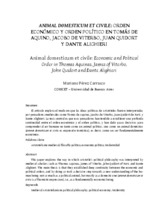Animal domesticum et civile: orden económico y orden político en Tomás de Aquino, Jacobo de Viterbo, Juan Quidort y Dante Alighieri
Animal domesticum et civile: Economic and Political Order in Thomas Aquinas, James of Viterbo, John Quidort and Dante Alighieri
Autor
Pérez Carrasco, Mariano
Editor
UCOPressFecha
2020Materia
Aristotelismo medievalFilosofía política
Economía política
Modernidad
Medieval Aristotelianism
Political philosophy
Political economy
Modernity
METS:
Mostrar el registro METSPREMIS:
Mostrar el registro PREMISMetadatos
Mostrar el registro completo del ítemResumen
El artículo explora el modo en que las ideas políticas de Aristóteles fueron interpretadas
por pensadores medievales como Tomás de Aquino, Jacobo de Viterbo, Juan Quidort de París y
Dante Alighieri. La tesis central es que esos pensadores han tendido a establecer una profunda
continuidad entre el orden económico y el orden político, y han dado pasos decisivos para
comprender al ser humano no tanto como un animal político, sino como un animal doméstico
(animal domesticum et civile es expresión tomística), es decir, como un ser fundamentalmente
económico. This paper explores the way in which Aristotle’s political philosophy was interpreted by
medieval scholars such as Thomas Aquinas, James of Viterbo, John Quidort of Paris and Dante
Alighieri. The main thesis is that they established deep continuity between the economic and
political orders, and by doing so took a decisive step towards a new understanding of the human
being: not so much as a political animal, but mostly as a domestic one (animal domesticum et
civile is a Thomistic expression), i.e., as a fundamentally economic being.

